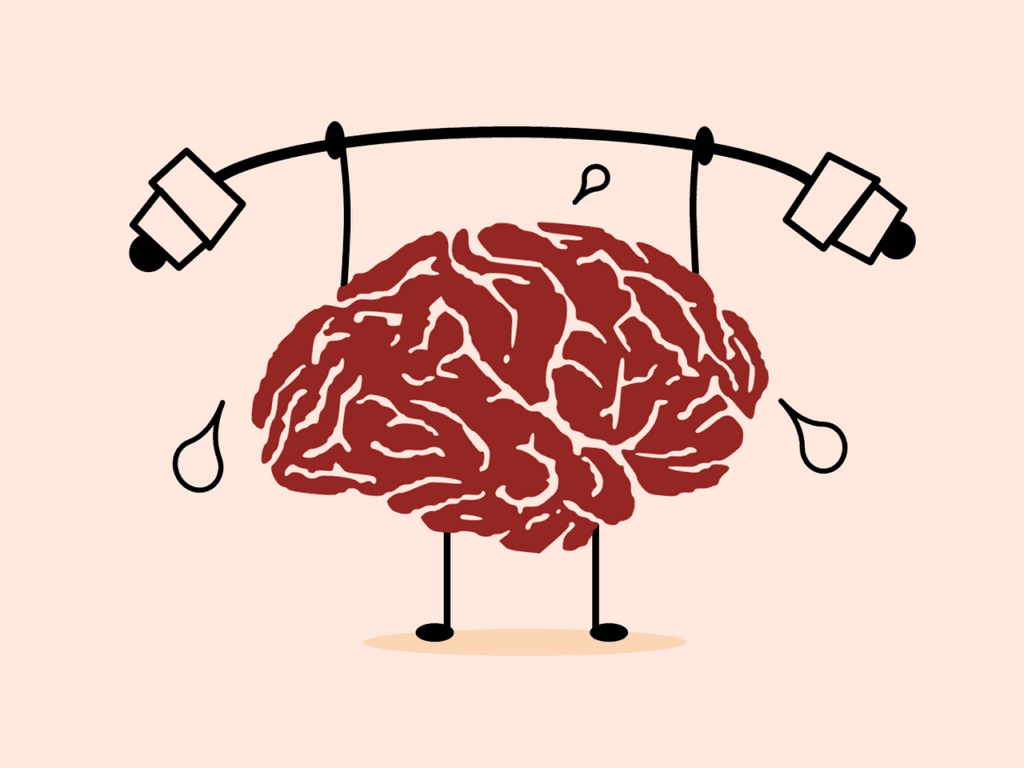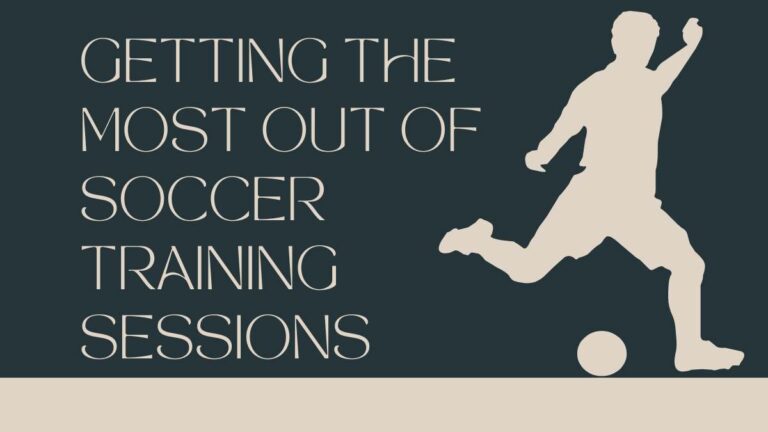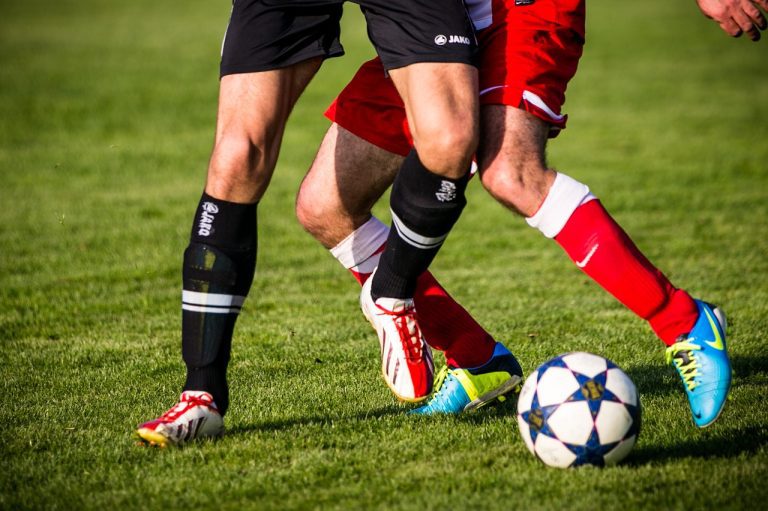Mastering Mental Toughness: How to Train Your Mind for Soccer
When it comes to sports, mental toughness is just as important as physical fitness. In higher levels, the thing that separates elite athletes from the average ones is their mentality. This is why mental toughness is extremely for soccer players to perform their best on the field.
But what exactly is mental toughness, and how can soccer players develop it? In this article, we’ll explore the key components of mental toughness such as the mindset, mental performance skills, and self-awareness. We’ll also offer tips and strategies for building mental toughness so that you can stay strong, focused, and confident both on and off the field.
If you’d like to learn how you can improve yourself as a player, then make sure to check out our in-depth guide on how to get better at soccer.
So let’s get started!
Understanding Mental Toughness in Soccer:
Mental toughness is the ability to stay strong and focused, even when things are tough. In soccer, that means being able to stay confident and composed, even when you’re making mistakes or your team is losing. It means having the resilience to bounce back from setbacks, and the determination to keep pushing forward.
There are a few different things that contribute to mental toughness in soccer. One is your mindset. The way you think about yourself and your abilities can have a big impact on your performance. If you have a positive, growth-oriented mindset, you’ll be more likely to stay motivated and focused, even when things are going your way.
Another important factor is mental performance skills. These are specific techniques and strategies that you can use to manage your thoughts, emotions, and behavior on the field. For example, you might use visualization to help you stay calm and focused before a big game, or you might use positive self-talk to boost your confidence.
Finally, self-awareness is also critical to mental toughness. This means being able to recognize your strengths and weaknesses and being willing to work on improving yourself. If you know what you’re good at and what you need to work on, you’ll be better equipped to deal with the challenges of the game.
Key Factors to Building Mental Toughness
In order to build mental toughness, you have to focus on improving things such as self-awareness, growth mentality, right mindset, and mental performance skills.

1. Self-Awareness
Building mental toughness in soccer starts with understanding yourself. That’s why self-awareness is crucial for mental toughness. Self-awareness is the ability to recognize your emotions, thoughts, and behaviors and how they impact your performance on the soccer field.
Without self-awareness, you can’t improve your mental toughness. When you’re self-aware, you can identify what triggers negative thoughts or behaviors and work to counteract them. You can also identify your strengths and leverage them to your advantage.
For example, if you know that you tend to get angry when the opposing team is trash-talking, you can work on managing your emotions in those situations. Or, if you know that you’re great at communicating with your teammates, you can use that strength to motivate and support them during games.
2. Growth Mindset and Self-Efficacy
Self-awareness goes hand in hand with a growth mindset, self-efficacy, and a healthy striving mentality. A growth mindset is the belief that you can improve your abilities through hard work and dedication. Self-efficacy, on the other hand, is the belief in your ability to succeed in specific situations, and a healthy striving mentality is the drive to push yourself to be the best you can be without sacrificing your well-being.
By developing these mindsets, you can build mental toughness that will help you overcome challenges and setbacks on the soccer field. You’ll be able to bounce back from mistakes, maintain your focus, and push yourself to new levels of success.
3. Right Mindset

Developing mental toughness in soccer requires having the right mindset. But what exactly is mindset, and how does it relate to mental toughness?
Mindset refers to the attitudes, beliefs, and assumptions that shape the way we approach challenges and opportunities. In the context of sports, having a positive and resilient mindset means that a player can maintain focus and composure even in the face of adversity.
Here are some tips for developing a positive and resilient mindset:
- Stay positive: Positive thinking is crucial for mental toughness in soccer. Encourage yourself to stay optimistic and look for the good in every situation.
- Stay in control: One of the key aspects of mental toughness is the ability to stay in control of your emotions and reactions. Practice staying calm under pressure, and focus on what you can control.
- Embrace failure: Failure is a natural part of the learning process, and it can actually help you grow and improve as a player. Don’t be afraid to make mistakes, and learn from them so you can become a stronger and more resilient player.
By adopting a positive and resilient mindset, you can develop the mental toughness necessary to succeed on the soccer field.
4. Mental Performance Skills
Mental toughness in soccer requires not just a positive mindset and self-awareness, but also a set of mental performance skills. These skills allow players to maintain focus, stay calm under pressure, and bounce back from setbacks. Some of the most important mental performance skills for soccer players include:
- Resiliency skills: Resilience is the ability to recover quickly from difficulties and setbacks. In soccer, resilience is crucial for players who face adversity such as missed shots or goals, injuries, or losses. Developing resilience involves techniques such as goal-setting, positive self-talk, visualization, and managing negative emotions.
- Attention control: Soccer players must be able to focus on the task at hand, even when distractions arise. Attention control involves techniques such as mindfulness, breathing exercises, and mental imagery to help players stay present and at the moment.
- Emotional regulation: Soccer is an emotional game, and players must be able to manage their emotions effectively to avoid distractions and stay focused. Emotional regulation techniques include deep breathing, progressive muscle relaxation, and cognitive reappraisal.
By developing these mental performance skills, soccer players can build their mental toughness and become more resilient, focused, and effective on the field.
Strategies for Mastering Mental Toughness in Soccer
There are various strategies that you can implement while trying to master mental toughness in soccer. Some of the most important strategies are given below:
1. Building Confidence

Confidence is an essential component of mental toughness. When you are confident, you are more likely to take risks, trust your instincts, and bounce back from setbacks. Here are some tips for building confidence:
- Grow your confidence through preparedness: The more you practice and prepare, the more confident you will feel on the field. Make sure you are putting in the time and effort to develop your skills and knowledge of the game.
- Visualize success: Visualization is a powerful tool for building confidence. Take some time to imagine yourself performing well in different game scenarios. Picture yourself making successful passes, scoring goals, and executing game-winning plays.
Remember that confidence is something that can be developed over time. By putting in the work and focusing on your strengths, you can build the confidence you need to be mentally tough on the soccer field.
2. Overcoming Mistakes
Mistakes are an inevitable part of soccer, and how players respond to them can make or break their performance. Mental toughness plays a crucial role in dealing with mistakes. Players need to be able to stay focused and resilient, even when things don’t go according to plan. To overcome mistakes, players should:
- Reframe their mindset: Instead of dwelling on the mistake, players should focus on what they can do to make things better. They can also try to view the mistake as a learning opportunity and use it to improve their skills and knowledge of the game.
- Practice self-compassion: Mistakes can be emotionally taxing, and players need to be able to forgive themselves and move on. Practicing self-compassion means being kind and understanding towards oneself, acknowledging that everyone makes mistakes, and using the mistake as an opportunity to grow and improve.
3. Dealing with Success

While success can be a confidence booster, it can also be a double-edged sword. It can lead to complacency and a lack of motivation to continue improving. To maintain mental toughness in the face of success, players should:
- Stay humble: Remembering that success is fleeting and that there is always room for improvement can help players stay grounded and motivated.
- Set new goals: Instead of resting on their laurels, players should use their success as motivation to continue pushing themselves. Setting new goals and striving towards them can help players maintain their mental toughness and continue to improve their performance.
4. Long-term Development
Mental toughness is not something that you just have. It’s something that you build over time. And it’s not always easy. There will be setbacks and challenges along the way. But if you’re willing to put in the work, you can develop the mental toughness you need to succeed in soccer.
One of the most important things you can do to maintain mental toughness during long-term development is to focus on the process, not the outcome. This means focusing on your own progress and improvement, rather than just winning or losing. When you focus on the process, you’re more likely to stay motivated and focused, even when things are tough.
Another key factor in long-term development is setting realistic and achievable goals. When you set goals that are too easy, you’ll get bored. And when you set goals that are too hard, you’ll get discouraged. So find a balance and set goals that are challenging but achievable. This will help you build confidence and motivation, which in turn strengthens mental toughness.
Finally, having a support system is essential for maintaining mental toughness during long-term development. Coaches, teammates, and family members can all provide support and encouragement during difficult times. They can also help you stay accountable and provide constructive feedback for improvement.
With these tips in mind, you can continue to develop and maintain your mental toughness throughout your soccer career.
Final Thoughts
Mental toughness is a crucial component of success in soccer, as well as in other aspects of life. By developing self-awareness, adopting a growth mindset, and practicing mental performance skills, players can improve their ability to stay focused, resilient, and confident in the face of challenges.
Along with training effectively and improving your soccer intelligence, soccer players should focus on improving their mental toughness as well.
It’s also important to remember that mental toughness is a long-term process that requires patience and perseverance. By embracing a positive and resilient mindset, players can master the mental game of soccer and achieve their full potential on and off the field.
Like what you’ve read? Make sure to check out our article on how to get the most out of your training sessions.







